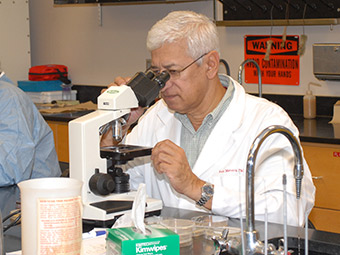Importance of Native Seeds in White-Winged Dove Diets Dominated by Agricultural Grains
Document Type
Article
Publication Date
12-13-2008
Abstract
Agricultural intensification is a key factor in the decline of many avian populations throughout the world, yet the exact mechanisms that contribute to these declines are relatively unresolved, especially for seed-eating species. We tested the hypothesis that forage quality, particularly protein content, limits productivity in birds consuming diets dominated by agricultural grains and lacking in native forages. We used white-winged doves (Zenaida asiatica) because columbids are highly granivorous and white-winged doves have declined in areas dominated by grain agriculture. We randomly assigned 52 pairs of captive doves to 1 of 2 treatments: we fed one treatment sorghum (Sorghum bicolor) and the second sorghum plus native seeds (croton [Croton sp.] and native sunflower [Helianthus sp.]). Birds with access to native seeds fledged 123% more young per pair, with young weighing 32% more at fledging than those fed only sorghum. Doves with access to native seeds selected a diet consisting of 43% sorghum, 32% croton, and 25% sunflower. We conclude that agricultural grains, which typically have high metabolizable energy and low to moderate protein concentrations, are not sufficient for normal productivity of white-winged doves. The lack of native forages with sufficient metabolizable energy and protein content may be a factor in the declining productivity of white-winged doves in the lower Rio Grande Valley of Texas, USA, as well as other species in regions dominated by agriculture.
Recommended Citation
Pruitt, K.D., Hewitt, D.G., Silvy, N.J. and Benn, S. (2008), Importance of Native Seeds in White-Winged Dove Diets Dominated by Agricultural Grains. The Journal of Wildlife Management, 72: 433-439. https://doi.org/10.2193/2006-436
Publication Title
Journal of Wildlife Management
DOI
10.2193/2006-436



Comments
2008 The Wildlife Society
https://wildlife.onlinelibrary.wiley.com/share/WFFJTYXCUUVZ4BTJ2UEF?target=10.2193/2006-436